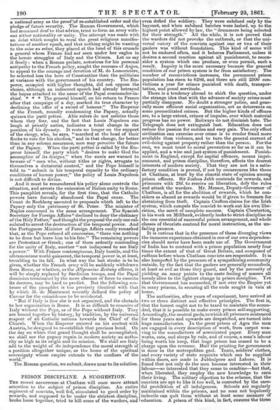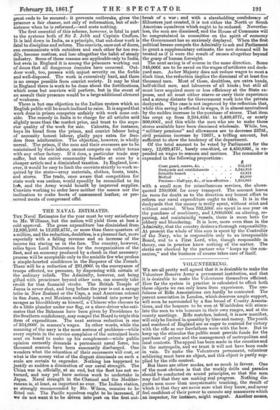PRISON DISCIPLINE. A SUGGESTION.
THE recent occurrence at Chatham will once more attract attention to the subject of prison discipline. An entire regiment of convicts, well fed, stimulated to good order by rewards, and supposed to be under the strictest discipline, broke loose together, tried to kill some of the warders, and even defied the soldiery. They were subdued only by the bayonet, and when subdued batches were lashed, up to the highest point allowed bylaw, the "drummers being selected for their strength." All the while, it is not proved that the warders did not provoke the outbreak, or that the uni- versal outcry of the convicts against one or two of their gaolers was without foundation. This kind of scene will not be endured often, and it behoves Parliament, unless it desires a second reaction against all punishment, to recon- sider a system which can produce, or even permit, such a result. Inquiry is the more necessary because the general condition of our prison system is far from satisfactory. The number of reconvictions increases, the permanent prison population has risen to 8286, and there are still 2500 con- victions a year for crimes punished with death, transpor- tation, and penal servitude. There is a tendency abroad to shirk the question, under the strange idea that with the advance of society crime must partially disappear. No doubt a stronger police, and gene- rally more efficient social organization, act as deterrents on some premeditated crimes. But the higher kinds of offence are, to a large extent, crimes of impulse, over which material progress has no power. Railways do not diminish hate. The Telegraph does not extinguish lust. Education does not reduce the passion for sudden and easy gain. The only effect civilization can exercise over crime is to render fraud more available than violence, and to turn the general current of evil-doing against property rather than the person. For the rest, we must trust to moral prevention -so far as it can be applied, and a wise and just system of punishment. Punish- ment in England, except for capital offences, means impri- sonment, and prison discipline, therefore, affects the dearest interests of modern society. That they are not in a satis- factory condition is proved, if not by occurrences like those at Chatham, at least by the chaotic state of opinion among prison officers. Sir Joshua Jebb contends for rewards, and prisoners with 28/. to receive on liberation, defy the rules and attack the warders. Mr. Measor, Deputy-Governor- of Chatham, is all for the abolition of rewards, which he con- siders as absurd as rewards would be if given to freemen for abstaining from theft. Captain Crofton claims for. the Irish system, which compels the convict to work out his own libe- ration, the merit of complete success. Captain Chesterton, in his work on Milbank, evidently looks to strict discipline as the one essential of successful prison arrangement, and whole classes of theorists contend for moral instruction, as the nn. failing panacea. It is curious that in the presence of these diverging views the immense experience obtained in one of our own dependen- cies should never have been made use of. The Government of India has to contend with a prison population nearly four times the extent of that of Great Britain, and composed of ruffians before whom Chatham convicts are respectable. It is also hampefed by the presence of a sympathizing community outside, by the fact that the gaolers are generally scoundrels, at least as evil as those they guard, and by the necessity of yielding on many points to the caste feeling of masses all keenly alive to the lightest change in prison discipline. Yet that Government has succeeded, if not over the Empire yet in many prisons, in securing all the ends sought in vain at home.
The authorities, after years of experiment, have arrived at two or three distinct and effective principles. The first is, that the honest ought not to be taxed to maintain the scoun- drel, that it is possible to make every prison self-supporting. Accordingly,the central gaols, towhich all prisoners sentenced for three years and upwards are despatched, are turned into huge manufactories. In the great prison of Agra the men are engaged in every description of work, from carpet wea- ving to the manufacture of .arsenicated paper. Every man works, eats, and sleeps by rule, and of course, a man's labour being worth his keep, that huge prison has ceased to be a charge upon the revenue. Half the printing for government is done in the metropolitan gaol. Tents, soldiers' clothes, and every variety of state requisite which can be supplied within doors, are made in Jubbulpore and Lahore. It is found that not only do the men become interested in their labour—so interested that they cease to combine—but that, when liberated, they employ the new knowledge to earn their living. The solitary objection to the scheme, that the convicts are apt to like it too well, is corrected by the care- ful prohibition of all indulgences. Schools are regularly maintained within the prisons, and no man not hopelessly imbecile can quit them without at least some measure of education. A prison of this kind, in fact, ensures the three great ends to be secured : it prevents outbreaks, gives the prisoner a fair chance, not only of reformation, but of sub- sistence when he is reformed,—and costs nothing. The first essential of this scheme, however, is fatal in part to the systems both of Sir I. Jebb and Captain Crofton. It is laid down in India, as a principle, that out-door work is fatal to discipline and reform. The convicts, once out of doors, can communicate with outsiders and each other far too rea- dily, become restless, and lose altogether the habit of steady industry. Some of these reasons are applicable only to India, but even in England it is among the prisoners working out of doors that all dangerous emeutes have occurred. Out- door work, too, presses with unjust severity on the feeble and well-disposed-. The work is excessively hard, and there is no escape possible from convict society. It may be that in England there is work to be done about the fortifications, which none but convicts will perform, but in the event of an assault their presence would be a large additional element of weakness.
There is but one objection to the Indian system which an English public will be much inclined to raise. It is argued that work done in prison competes unfairly with work done out- side. The remedy in India is to charge for all articles sold slightly more than the market price, and trust to the supe- rior quality of the work for sale. Calcutta, for instance, buys its bread from the prison, and convict labour being of necessity honest labour, gladly pays extra for free- dom from adulteration. The objection, however, is wholly unreal. The prison, if the men and their overseers are to be maintained by their labour, cannot compete on unfair terms with any other factory. If it does, a particular trade may suffer, but the entire community benefits at once by a cheaper article and a diminished taxation. In England, how- ever, it would be easy to limit the convicts strictly to work re- quired by the state—army materials, clothes, boots, tents, and stores. The trade, once aware that competition for state work was useless, would speedily be reconciled to its las, and the Army would benefit by improved supplies. Convicts working to order have neither the means nor the inclination to make boots of unseasoned leather, or pre- served meats of compressed offal.































 Previous page
Previous page